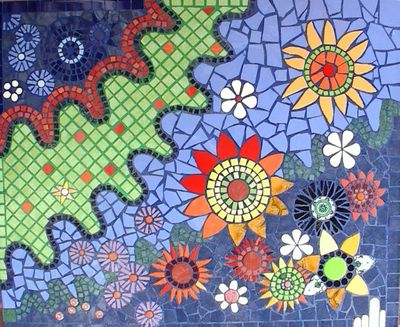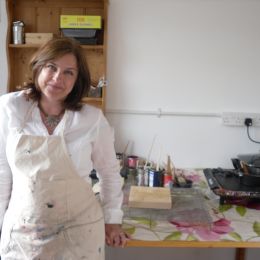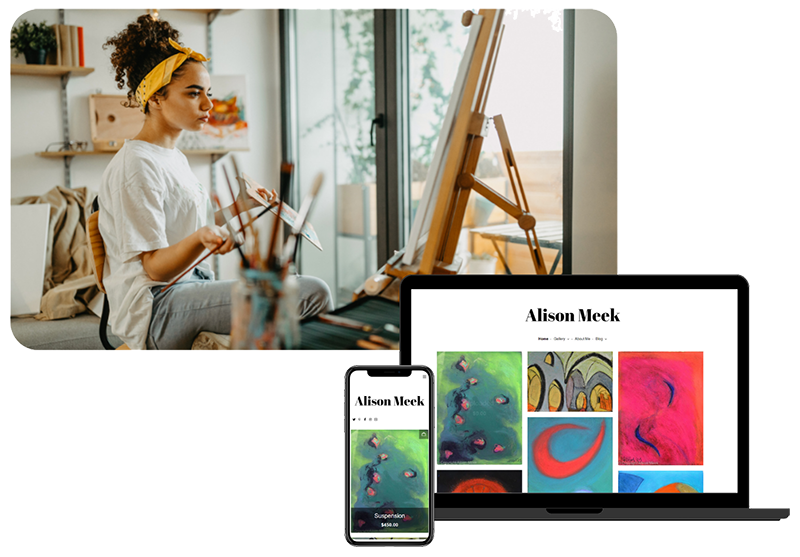Hello! We hope you enjoyed Part 2 in the ‘Art and Money’ series, in which we focussed on Generating Traffic. Over the next few months we’ll be continuing to look at some of the issues to do with selling your work online, including pricing your work, funding options, marketing & networking, and maintaining your success. With a focus on selling online, we’ll be talking to artists who are successfully making money through their art, getting feedback from the buyers of art, and giving you first hand advice on what can at first seem a daunting topic!
Funding for artists
- What are the options available for funding your artwork?
- What is the best option for you?
- How do other artists fund their work?
What funding options are available to you?
Selling your artwork
For many artists, craft-makers, and illustrators, the ideal way to make a living is by selling the work they create. You might be thinking that making your art your business is a daunting and unrealistic prospect, but you could be surprised at the options available to you in order to get going. Here are few ways you can get started with selling your art:
- Through your website – see our last article for advice on how to turn visitors into buyers!
- Through online marketplaces (ArtWeb!!)
- Through galleries and independent exhibitions
- Through arts and craft fairs – see our article from December on how to hold a successful stall
- Being part of open studio events: See Brighton Open Houses, Suffolk open studios, or Hackney Wicked for examples of how open studios run.
- Through networking online
Sharing your skills – teaching, workshops, and talks
Sharing your skills can be a rewarding experience, and even help develop and progress your practice. Many artists find the process extremely helpful, both financially and creatively. Below are some examples of artists who use their skills and experience to teach others:
- Christine Lloyd Walker uses her mosaic skills to hold workshops for children’s parties, community groups, fairs and festivals.
- Julia Rigby holds workshops for children and adults, sharing her skills in painting, print-making, batik, and watercolours.
- Tiffany Logan uses her specialised skills to host one-day workshops for adults in the medium of Encaustic.
Gallery education can also be a great supportive addition to your practice. Engage is an organisation providing resources and information to gallery educators, or artists looking to learn more about the industry.
Residencies
Many residencies out there can be notoriously tricky to get onto, but are worth every effort if you do! They can be a brilliant way of allowing you time and space in order to make new work. They usually work by providing you with a studio space, and sometimes an additional bursary for living costs, in return for you creating new work, hosting talks or workshops, holding exhibitions or donating work. Below are some great places to find out about residencies around the world:
Grants
There are many funding bodies who offer bursaries or grants to artists. ArtQuest have a great directory, and we have selected a few of the most prominent places to look for information and advice on grant opportunities:
- Arts Council England: Since the arts funding was cut by 35%, acquiring funding has become even more competitive. Even so, Arts Council England encourage applications from individuals and businesses.
- Crafts Council Offer a development award with 4 deadlines per year.
- The Leverhulme trust
- The Jerwood Foundation offer prizes in various disciplines throughout the year.
- The Elephant Trust offer small grants for specific project proposals
- Ideas Tap: The Ideas Fund is open all year round, with 4 deadlines per year. Max £1000, and only people up to 25 years old.
Part-time job
If you are just starting out with your art business, you might find it difficult to fund the creative work in order to sell it, a classic catch-22 situation! Many artists work around this by taking on a part or full-time job, in order to fund their creative endeavours until they build a business from which they can pay themselves a salary.
Try not to worry about having to work in a role that might not be what you want to do in life, it’s important to remember the reason why you are working and focus on your creativity outside working hours. The most important thing is to MAKE TIME for your artwork outside your job. If you notice that your artwork is starting to go down the list on your priorities, then it might be time to readdress your timetable and work out where things might be going off-track.
It’s worth keeping an eye out for arts-based jobs too, as this could help you progress further within your creative career. Some good places to find art-related part and full-time jobs:
- Ideas Tap
- Arts jobs
- Arts Hub
- Guardian Jobs
- Engage
- A-N magazine (members only)
Crowd Funding
Crowd Funding is a relatively new concept, whereby instead of asking for a lump sum from one donor, you ask lots of people for small amounts. Kickstarter is the most well-known place to get started with this idea. It generally works by offering something in return for donations, ranging from postcards for small donations to limited edition prints for more generous donors. Lots of projects have been initiated in this way, so it’s worth a look! Check out some current art projects on kickstarter to get ideas.
Loans for further education
- Career Development loan: If you’re UK-based and thinking of furthering your artistic career by doing a Masters or post graduate qualification, it’s possible to acquire a ‘career development loan’. You can borrow up to £10,000 in order to support you through further education and allow you to focus more fully on your creative work.
- AHRC Funding: Supply funding to a limited number of higher education students.
What is the best option for you?
These days, many artists find that they need to have multiple sources of funding in order to create new work and live a comfortable life. What works for you might not work for another artist, and vice versa! For example, one artist might make work specifically for selling, whereas another artist might see there practice as non-commercial, and will therefore need other sources of income in order to fund it. So don’t worry if you think you are doing too much or too little, the most important first step is to understand all of the options available to you. If you keep art a priority, you will get where you want to be!
How do other artists fund their work?
We mentioned above a few artists who support their practice through sharing their skills in workshops and education – this is a great way for many artists to fund their creative work.
We also recently conducted a little poll on our Facebook page, asking our Facebook followers how they funded their practice. It told us that having a job to support creative practice seems to be the most popular method in funding creativity, with selling artwork being the 2nd most popular.
We asked our Twitter followers: ‘Artists, how do you fund your practice? Selling your work, part-time jobs, sharing your skills, all of the above?!’ Here are some of the replies we got:
ceramicgardener @TheArtistsWeb: luckily for me selling my work….but it is not the easiest way to make a living!
redpaint17 @TheArtistsWeb: More than anything, I wish I could paint full time and not squeeze it around the day job…but I squeeze my art in every day.
cnpdaz @TheArtistsWeb: Yes, all of the above! As a freelancer, I work round the clock it seems! Whatever you can do to fund your passion.
So to sum it up, every creative person finds their own way to fund their practice, and it’s all about finding the best way for you! Hopefully this article has helped those artists who are finding it tricky to balance art and finances, and given some starting points for finding the best options out there.
Do you have any great funding ideas that we haven’t listed? Comment on this article with your suggestions. We’ll be back soon with the next Art and Money article… see you then!
Want to see the rest of the Art and Money series? Here are the links:










